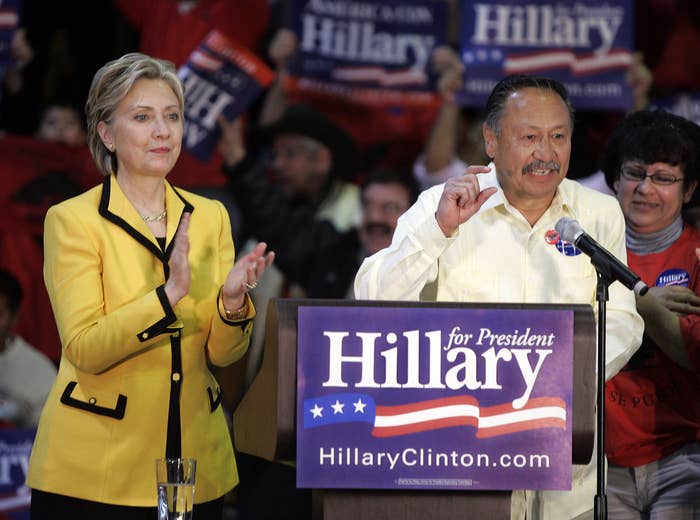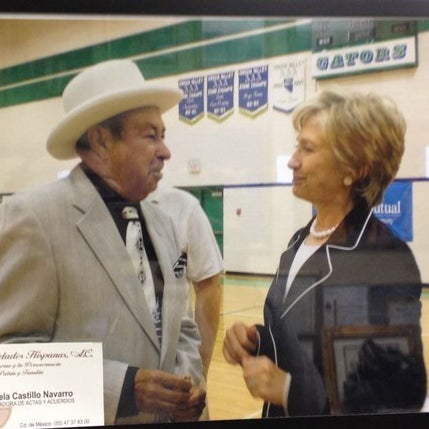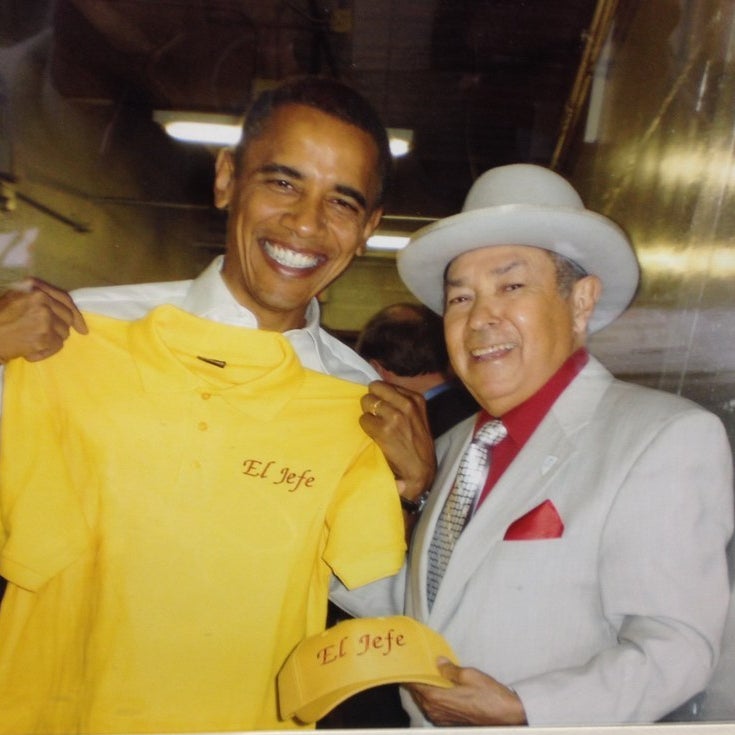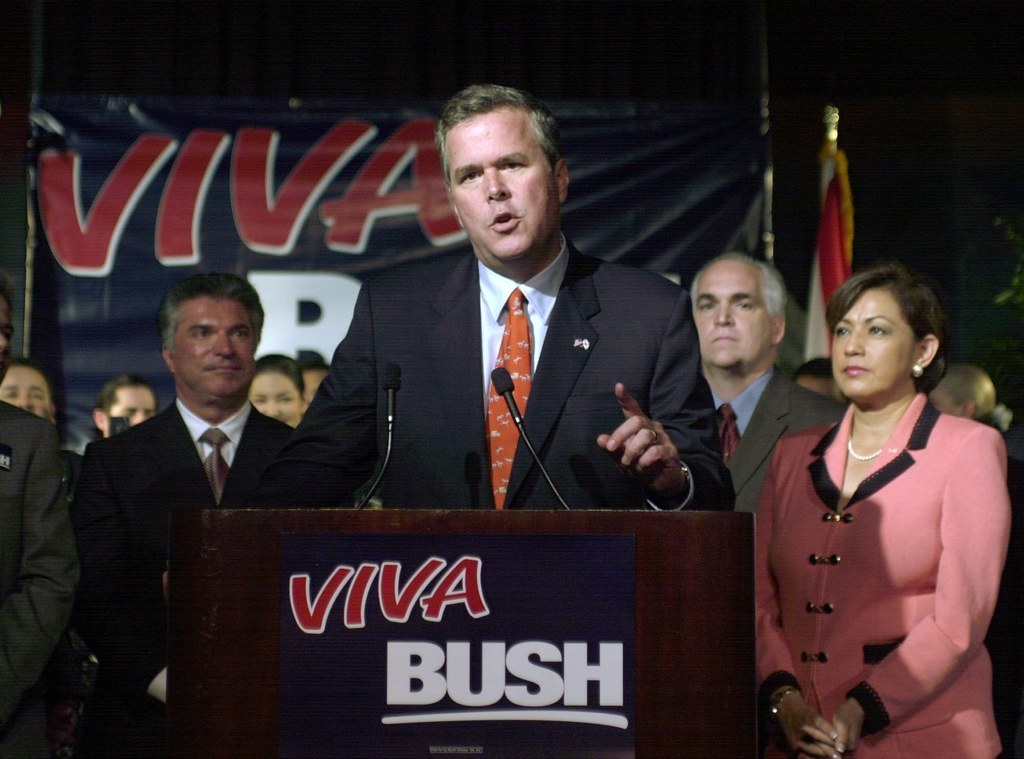
Republicans are keenly aware that they must begin to peel away Latino voters from Democrats, who gave President Obama 71% of their vote in 2012. But there's a huge problem for those 2016 efforts, rarely discussed and largely forgotten.
Hillary Clinton, the presumptive favorite for the Democratic nomination, beat Obama 2–1 among Latino voters in the 2008 primary. It wasn't just name recognition, either. The Clintons have a robust network of Latino leaders and activists, and long history with outreach that dates back to 1970s in Texas.
This is not to say Clinton's path is totally clear — her 2008 campaign was not without stumbles, and she faced difficult questions last year from activists on immigration. If Jeb Bush were the Republican nominee, some argue, he might actually compete for a significant share of Latino support, something activists aren't totally closed to. But there is no other candidate both as likely to win a party nomination and who will start with the established, enduring Latino support, as Clinton.
"Republicans have a Latino problem," said Alfonso Aguilar, a former official in the George W. Bush administration and director of the American Principles Project's Latino Partnership, which promotes conservative values to the Latino community. He described the Republican policies around immigration that put the party stuck between an Obama "amnesty" position and a Steve King "enforcement-only" stance.
"Hillary would be a formidable candidate with Hispanics," he said.
Even for a candidate who has been on the national stage for decades, Clinton's history with Latino voters goes back a surprisingly long way.
In 1972, when a young Hillary and Bill Clinton were working the ill-fated George McGovern campaign, she worked closely with well-respected union leader, Franklin Garcia, who took her under his wing as she helped register Latino voters in south Texas and along the Rio Grande Valley.
"Hispanics in South Texas were," she wrote in her 2003 memoir Living History, "understandably, wary of a blond girl from Chicago who didn't speak a word of Spanish." But Garcia "took me places I could never have gone alone and vouched for me to Mexican Americans who worried I might be from the immigration service or some other government agency." Garcia drove her and Bill across the border to Matamoros, a dive that had only a "decent mariachi band," she wrote, but where she indulged in barbecued cabrito, or goat.
Garry Mauro, one of her first contacts in Texas, told the San Antonio Express in 2008 that back then she had a "cultural affinity with Hispanics," asking questions and listening to their concerns, a dynamic that would be on display again, more than three decades later in Nevada, as she tried to woo an influential Latino activist.
Eddie Escobedo was a flashy dresser — suits and hats to match — and hotly in demand by Democratic politicians.
The owner of a radio station and El Mundo newspaper, both of which he used to great effect, the late Escobedo was an important ally for anyone who wanted to get their message out to Latinos in Nevada. That's why Brian Greenspun, a Clinton ally who runs the Greenspun Media Group (which includes the Las Vegas Sun, Las Vegas Weekly, and Las Vegas Magazine), invited Escobedo along with other minority leaders to his home for dinner to meet with Clinton as she was exploring a 2008 campaign.
"She had a way about her," says Eddie Escobedo Jr., who was at the dinner. His father died in 2010 and left El Mundo to him.
"The way my dad explained it, she was somebody you could talk to," Escobedo Jr. said. "She spoke from the heart and asked about what the Hispanic community was going through and what had to be done. My dad was taken aback by Hillary, by how she was able to communicate and listen and how she wanted to help Hispanics."
Escobedo supported Clinton "tooth and nail," his son says — but of course she did not win. Obama campaign senior advisers repeatedly went to the El Mundo offices to wear down the activist, and finally got him to take a call from Obama. The two eventually had a meeting at the MGM Grand in Las Vegas, where Escobedo presented Obama with a T-shirt and hat with the words "El Jefe" — the boss — on them.
When Escobedo died from cancer in 2010, the Clintons offered their condolences in a letter to the family and Obama called Escobedo Jr.


Longtime influential Nevada activist Eddie Escobedo with Hillary Clinton and Barack Obama, who both curried his support.
Democrats say it was these kinds of connections and endorsements, and not just name recognition against the ascendant but unknown Obama, that helped Clinton with Latinos in 2008. Her deep network of influential local and state leaders included former Los Angeles Mayor Antonio Villaraigosa, who crisscrossed California for her, and Henry Cisneros from Texas, a longtime Latino leader who served in Bill Clinton's cabinet.
They also say Latinos did well during her husband's presidency.
"Latinos fondly remember the Clinton years from an economic perspective," said Democratic strategist Jose Parra, who worked for Harry Reid. "Older folks have prosperous memories from the Clinton terms."
"Rarely have Hispanics prospered economically like they did under the Clinton administration, which transferred goodwill and good feelings," Democratic pollster Fernand Amandi said, noting that 2008 was the first year the Hispanic vote was competed for in a major way.
Michael Trujillo, a field director for Clinton in North Carolina, California, and Texas in 2008, who now serves as a senior adviser to Ready for Hillary, said a nostalgia effect exists for some Latino voters when it comes to the Clintons because in 1992 and particularly in 1996, recipients of Ronald Reagan's amnesty that allowed more than 3 million undocumented immigrants to stay in the country legally, were able to cast their first votes — and they did so for Bill Clinton.
Still, immigration activists on the left and Republicans reject the idea that Clinton has locked up the Latino vote.
High-profile immigration advocates say she must clarify her stances after a major miscue in 2008 and shaky public answers in 2014 around the issue of deportations.
Clinton, facing pressure before a Democratic debate in 2007, released a statement saying, "As president, I will not support driver's licenses for undocumented people and will press for comprehensive immigration reform that deals with all of the issues around illegal immigration, including border security and fixing our broken system."
Many Democrats believe her stance gave Latino voters a clear difference between her and Obama and say the tide began to turn afterward. Lydia Camarillo with the Southwest Voter Registration Education Project, said in 2008 that when Obama supported driver's licenses for undocumented immigrants, he gained the support of 29% of the Latino electorate in California.
Just last year, DREAMer activists, undocumented youth brought to the country as children, began confronting Clinton in a series of protests around the country, including an instance in Iowa where she was pressed to say whether she supported Obama's executive actions. She gave an awkward answer — how the country needs to "elect more Democrats," which confused and annoyed activists. Influential Univision anchor Jorge Ramos asked if she had a "Latino problem" after her comments last summer during the surge of unaccompanied minors from Central America.
"Some of them should be sent back," Clinton said at the time, noting the children who should be deported are the ones who don't have a legitimate claim for asylum or a family connection. "They need to be given the basics, the necessities and as much love as we can," she added.
"Hillary Clinton hasn't exactly been the patron saint of undocumented immigrants," said longtime Republican strategist Ana Navarro. "Obama totally out-strategized her," Navarro continued, adding that Clinton's stance on the unaccompanied minors is an emotional issue "and unpopular position for many Latinos."
It's important, activists said, not to let Clinton off the hook and make her prove her credentials.
"For us the reason we started targeting her, a big part of it was that in her statements, with the children, we didn't see that she understands the issue very well," said national immigration activist Erika Andiola, who was there when Clinton was confronted in Iowa. "She's not in a place where she should be, as left as we would like her to be on the side of the immigrant community."
"Absolutely, she needs to clarify her stances," said National Day Laborer Organizing Network (NDLON) Director Pablo Alvarado. "If she wants to run on a conservative agenda on immigration then she can come out and say it, but she has to know she will alienate a lot of us. We want to know what's going to happen with the 7 million or more people excluded by the president, whether deportation policies will continue to persecute them."
Activists like Alvarado believe it's better when Latino voters are not taken for granted and are fought for by both parties. This partly explains why they have begun talking up Jeb Bush as someone they're intrigued by.
"We're going to start pressuring Jeb Bush," Andiola said. "That by default is going to pressure Hillary to be more to the left and not make enforcement her first priority."
One activist went further, saying that Bush, who last year said parents bringing their children across the border should be seen as an "act of love," could be better for immigration advocates than Clinton.
"I think it is an open question whether Jeb Bush is to the left of Hillary Clinton on the issue of immigration — it's a real and open question."

With Hurricane Katrina bearing down on Florida in 2005, Jeb Bush, as he had done before and would do again, resisted the pressure of television networks and easily fielded questions in both English and Spanish, rather than have two separate press conferences. Bush considered it a victory, those familiar with his thinking say, to have his answers broadcast nationally on CNN to Spanish speakers as well as everyone else.
This, Republicans say, illustrates the respect and close relationship he has with the Latino community. Bush's wife Columba is Mexican-American and his son, George P., is an up and coming Latino Republican in Texas.
"We've been long on lip service in the Republican Party," says Al Cardenas, a longtime Bush confidante who ran the local Republican Party with him in the early 1980s.
"It's always missing one essential ingredient, which is the first rule of engagement is to actually engage in the community," he continued. "Jeb Bush has been walking the walk for three or four decades in the Hispanic community. It's natural to him, he considers himself in every respect culturally assimilated and instinctively feels as comfortable in the Hispanic culture. It's a product of his 40-year marriage; he's embraced Miami's multicultural community."
"There's no way Jeb Bush will cede one inch of territory," Navarro said. "Good luck trying to out-Latino a guy who studies Latin American studies in college, has been married for 41 years to a woman born in Mexico, speaks fluent Spanish, lived in Latin America, oh, and makes killer guacamole. Not gonna happen."
A Bush nomination is far from a sure thing — he's not even a candidate yet, hasn't run for elected office in more than 10 years, and currently is out of step with much of the Republican base on both immigration and education.
But these Republicans point to the 1998 and 2002 governor's races when Bush received 61% and 56% of the Latino vote respectively as evidence that he has cracked the code and can reliably gain the support of the Hispanic community. It's also true, however, that those races happened at a time when Florida's Latino vote was largely Cuban and more conservative. In 2012, for example, Obama won the crucial voting bloc in Florida.
And the demographics have changed nationally.
"The formula [George W. Bush] used to win no longer applies because the demographic numbers have changed," said Republican consultant Luis Alvarado, with Revolvis in California.
He said the scope of the problem for Republicans is about more than traditional swing states in the Southwest.
"It's not just about Nevada, but also Georgia now. A 1–2% change in the Latino vote could be the difference between it being red or blue," he said.
Still, if surrogates matter as was pointed at with Clinton's outreach, Cardenas says Bush's 2016 campaign would be unmatched on that front.
"If he does proceed to run for president, unlike other candidates, his schedule will be filled with Hispanic leaders," he said.
"Of all the Republican candidates in the spotlight, he has the greatest facility to connect and build that bridge and that's including Latinos Ted Cruz and Marco Rubio," Alvarado said. "He has complete command of the language and of the culture and has a vision of how Latinos are the important building block to the future of the country."
Alvarado looked forward to a challenge for Bush in 2016.
"He has already earned [Latinos] respect, what they would like to see is if he maintains course and doesn't waiver with pressure from the extreme right of the Republican Party. That would give him a consideration to earn their vote," he said.
The former George W. Bush official, Aguilar, said Jeb Bush, like Clinton, can make a credible argument that he has a connection with major Latino groups like Mexicans through his family, Cubans through Florida and Puerto Ricans whose population has shot up in Florida, as well. But he said the GOP needs to truly grasp what Latino outreach is.
"Republicans think Hispanic outreach is translating speeches like the State of the Union, and having Hispanic spokespeople, which is fine, but if your message is not good, if your policy is not good, it doesn't matter if you have Hispanic faces like Cruz or Rubio," he said.
Mark Hugo Lopez with Pew Hispanic and Matt Barreto with polling firm Latino Decisions both said Clinton may be able to translate high Latino support for Obama's policies to herself.
"Latino registered voters overwhelmingly see the Democratic Party as more concerned with issues that affect the Hispanic community," Lopez said.
"The deferred action for sure, the one for kids and the ones for parents. If she commits to them — those are so incredibly popular — if she says she'll continue them it can push her even higher, but she needs to clarify that," Barreto said.
Clinton hinted about what she would like to see with immigration, calling his announcement a "historic first step" and tweeting, "Thanks to POTUS for taking action on immigration in the face of inaction. Now let's turn to permanent bipartisan reform."
Delia Garcia, the first Latina in the Kansas state legislature in 2004, is now on the Latino advisory committee for Ready for Hillary, a group that has thrown 14 parties for Latinas in the last year, with 30 to 70 people per event in states like Colorado, Kansas, Texas, and California, with a Miami event on tap.
She said because of her history in the state, Latinas in Texas say they see her as "familia" and "one of us," but acknowledged that she has heard the immigration complaints. On that front she has a suggestion for the eventual Clinton campaign.
"I do look forward to her adding a Latino, a Latina, in the inner circle that does have her ear," Garcia said.
Escobedo Jr. in Nevada said he had a meeting with Ready for Hillary in November, where 25 influential activists like him were asked to support a Clinton candidacy. Fernando Romero, a grizzled Latino advocate like his father, who has led Nevada's oldest Latino political organization, the aptly named "Hispanics in Politics," for more than 15 years, stood up and said, "What do we get?"
"Like a baseball going 99 mph it caught a lot of people off guard," Escobedo Jr. said.
And that question is at the heart of why he says that while a majority of the 25 people at the meeting said they will support Clinton, many like him are still on the fence.
He pointed to the practical problems with the immigration issue, often cast aside as less important to Latinos than many make it out to be, as a sticking point and something Clinton will have to be clear on.
"Immigration is a very big issue here in Nevada, which has the largest concentration of guest workers," Escobedo Jr. said. "They all have family members who can vote. It's an economic issue for us, Nevada was hit hard with workers doing construction who went back to Mexico."
So what does Clinton have to do to gain his support?
"Right now, she has to say she'll continue fighting for [deferred action], and that she supports the executive action, and reaffirm what the president has done and say what needs to continue to be done — then she will immediately gain the support of everybody else in that room."
Cardenas said this whole conversation goes back to the need for candidates to understand that demographic trends mean America can not be successful without Hispanics being successful.
And while he was speaking about Bush's relationship with Latinos, Cardenas could also have been talking about the challenge Republicans facing Clinton will be up against.
"It's something you have to earn, you don't gain that in a 30-second ad," he said.
